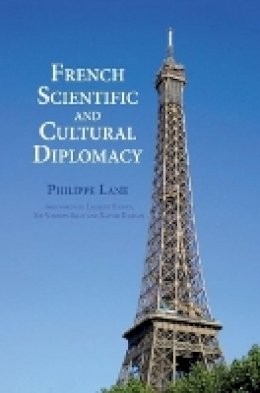
Stock image for illustration purposes only - book cover, edition or condition may vary.
French Scientific and Cultural Diplomacy
Philippe Lane
€ 60.05
FREE Delivery in Ireland
Description for French Scientific and Cultural Diplomacy
Paperback. This book provides an insider's account of the use of cultural diplomacy to protect and expand France's global influence. Num Pages: 144 pages, 2 black & white tables. BIC Classification: 1DDF; JFC; JPSD. Category: (U) Tertiary Education (US: College). Dimension: 233 x 156 x 10. Weight in Grams: 278.
France has long been engaged in a very active cultural and scientific diplomacy. It aims both at ensuring and valorising the international presence of France in the domains of language, culture, communication, or higher education and research. This diplomacy is backed by a network of cooperation services in embassies and cultural institutions, as well as by numerous operators and specialised agencies in various sectors. This book asks whether cultural diplomacy, invented by France in the 18th century, is in danger. It asks whether the present system, aimed at helping artists and creators, professionals of teaching and culture, researchers and intellectuals, can be improved. And it argues that a diplomacy of influence needs coherent foreign policy connecting sectors and promoting partnerships.
Product Details
Format
Paperback
Publication date
2013
Publisher
Liverpool University Press United Kingdom
Number of pages
144
Condition
New
Number of Pages
144
Place of Publication
Liverpool, United Kingdom
ISBN
9781846318658
SKU
V9781846318658
Shipping Time
Usually ships in 7 to 11 working days
Ref
99-50
About Philippe Lane
Philippe Lane is Professor of French Linguistics at Rouen University in France and currently seconded to the French Foreign Ministry. He is presently serving as Cultural Counsellor to the French Embassy in Jordan. He was a visiting Fellow in the Department of French Studies in Cambridge University from 2008-12. In 2011 he co-edited (with Maurice Fraser) "Franco-British Academic Partnerships - The Next Chapter", and (with Michael Worton) "French Studies in and for the 21st Century)", published by Liverpool University Press.
Reviews for French Scientific and Cultural Diplomacy
As the endorsements from politicians such as Laurent Fabius and Xavier Darcos suggest, Philippe Lane has produced a valuable and informative overview of the changes in France's approach to 'soft power', an approach that reflects the state's endeavour to ensure that its initiatives are more responsive to the challenges of making 'soft power' also 'smart power' and of deploying it to greater effect. More particularly, Lane focuses on recent changes in legislation whose aim has been to create new institutions capable of giving a greater, more coordinated impact to France's cultural initiatives abroad. Implicit in the changes is the recognition that past initiatives were sometimes stacked up one on top of another in a bureaucratic mountain and lacked an overall sense of cohesion. Accordingly, in January 2011 the Institut francais was inaugurated to oversee and integrate the efforts of individual French Institutes and cultural centres around the world. This was preceded, in the summer of 2010, by the creation of Campus France, which is designed to enhance the standing abroad of French higher education, professional training, and research. To complete the trio of new institutions with a major mission - this time industrial and commercial - France Expertise Internationale was launched in [End Page 444] April 2011, under the wing of the Ministere des affaires etrangeres et europeennes, its task being to promote French technical assistance and expertise on the global stage. As Lane emphasizes, the traditional view of cultural influence operating in its own sphere came to be seen as too limiting; what was required instead was the development of a 'diplomacy of influence', born of the recognition that cultural and scientific questions will be inseparably linked in the responses that need to be framed across a broad range of issues posed by globalization-from early years education to food security to climate change. Thus Lane maps out the challenges that these new French institutions face both in fostering a collaborative ethic across ministries, which was all too lacking in the past, and in the way that these bodies mediate France's relationship with the world as French cultural diplomacy engages with the arts, sciences, and education. The policy details and latest statistics that Lane has collated constitute a very useful tool for those working in the field of cultural policy; by pointing out that China created more than three hundred Confucius Institutes in over eighty countries between 2004 and 2013, he demonstrates the importance of this field as an arena for the pursuit of a competitive advantage. One of the results of Lane's lucid 'top-down' analysis is to whet the appetite for a complementary 'bottom-up' investigation of recent manifestations of French cultural influence operating outside of state-led initiatives, a notable example being the vertiginous growth in the numbers of French citizens in a city such as London, and the deployment of 'soft power' that this entails. Reviewed by July 2014 French Studies Volume LXVIII Number 3
